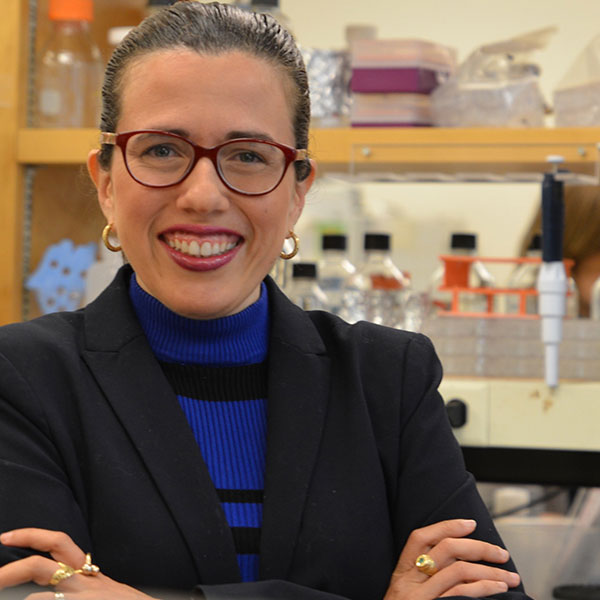Meet Olga Pena, scientist and advocate

My name is Olga Pena. I'm a woman, a scientist, a mom, and a Canadian immigrant. I was born and raised in a small town in the middle of the Andes Cordillera in Colombia.
Despite my family's financial challenges, my parents prioritized my education over many other commodities and their efforts meant that I was able to attend university. My dad used to say that, unlike them (mom and dad), who only got elementary education, supporting us in obtaining a university degree was the best and only inheritance they could give us.
Becoming a first-generation graduate
Moving from a small town to the capital city, Bogota, at the age of 16 wasn't easy. Adaptation and competition were tough, but despite the challenges, I discovered my passion for science research. I graduated at the top of my class, and became a first-generation graduate with 1 goal: to further pursue a Ph.D. in Microbiology and Immunology. However, achieving this in Colombia was very difficult due to the limited programs and scholarships available. In addition, acceptance into a graduate program overseas without knowing English or having any research experience was also challenging, but I was determined to overcome these obstacles.
After a few years of learning English and working in research laboratories in Colombia and the United States, my efforts paid off. I was accepted into an excellent Ph.D. program at the University of British Columbia in Vancouver, to do research on sepsis, a life-threating illness caused by a dysregulated immune response to an infection. I was fortunate to complete my doctorate having obtained excellent scholarships, several awards, and a great publication record, while also becoming a mom. I also became the first and only Ph.D. graduate in my family, developing an early diagnostic tool for sepsis. This was a real tribute to my dad, who strongly believed in the impact of education, and who passed away years ago due to this same illness and the absence of an early diagnosis.
After several years of research and management experience at institutions in Colombia, the United States, Australia and Canada, I became a science specialist at the CFIA. My job included leading international files such as the Biosafety Level 4 Zoonotic Laboratory Network (BSL4ZNet), an international network of animal and public health organizations from 5 countries aiming to respond to current and emerging zoonotic pathogens (disease-causing viruses and bacteria from animals) through trusted international partnerships. I joined the CFIA in 2019, through the highly competitive MITACS Canadian Science Policy Fellowship program. My excitement was evident when I was offered the opportunity to mainly handle a file that combined 2 aspects I deeply enjoy: research in infectious diseases and science diplomacy. Science diplomacy means facilitating international cooperation to achieve scientific goals. As a Canadian citizen, I'm proud to have been a part of this work at the CFIA, contributing my knowledge and skills to enhance Canada's continuing disease preparedness efforts.
Immigrant and International Women in Science Network
Although getting here hasn't been an easy or short path, this is usually the path that many immigrant women in science (IWS) experience. Based on these challenges and experiences, together with a fantastic group of IWS like myself, we co-founded the IWS Network, now with 9 chapters across Canada. The aim of the IWS Network is to increase awareness about the challenges experienced by IWS and their role in advancing science and innovation, while promoting equity, diversity and inclusion in Canada. This path has also been 1 of many trials and errors and this is why I'm also conscious of the power of mentorship, as I wish I would have had a bit more guidance in the early stages of my career. As a result, I participate as a mentor through different organizations, such as the Accessible Science Initiative – PDF (720 kb), to provide support to women and girls in science undergoing similar challenges.
As we celebrate International Women's Day, a day to reflect on the progress made on gender equality, let's not forget the many inequalities that still exist for women and girls in science, especially those from under-represented groups. From pay gaps and lack of universal daycare, to limited representation in leadership positions in all science ecosystems, including academia, industry and government. Personally, I hope to combine my science expertise and advocacy efforts to contribute to the development of evidence-informed policy in Canada, and the strengthening of science diplomacy in the world, a world that can offer equal opportunities and a level-playing field for everyone to advance, leaving no one behind.
Learn more
- Science and research at CFIA
- Our laboratories
- The CFIA leads a new approach to One Health risk assessment for SARS-CoV-2 (science.gc.ca)
- Working with the world's deadliest diseases
- International conference drives science forward in the post-pandemic era
Get more Inspect and Protect
- Want to learn more about what we do? Explore articles, videos and podcasts.
- Interested in reporting on a story? Contact CFIA Media Relations to arrange an interview with one of our experts.
- Have an idea or feedback to share? Get in touch!
- Date modified: